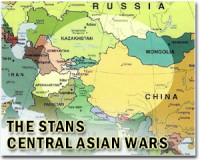| . |  |
. |
Washington (AFP) Nov 18, 2010 President Barack Obama will be walking a fine line at the upcoming NATO summit between upholding his pledges to withdraw US forces from Afghanistan and domestic opposition to a strict calendar, experts said Tuesday. At the meeting in Lisbon that kicks of Friday, Obama and his NATO partners are expected to formalize a plan to hand over security duties to Afghan forces by 2014. A year ago, Obama boosted the number of US troops in Afghanistan to 100,000 troops but promised to begin transferring security responsibility to Afghan forces by July 2011. But while the Obama administration continues to defend this date, it insists flexibility is required for an effective transition -- a move backed by Lisa Curtis, an Asia specialist at the The Heritage Foundation, a conservative think tank. "Just as we had a counterinsurgency strategy in place, just as we had the additional troops in place, we simply needed more time to make this strategy work," Curtis told AFP. The timetable for withdrawal has had to adapt to conditions on the ground, in the face of a fierce and persistent Taliban insurgency. Next year, "I think, was a nice goal to have one year ago; I think the progress hasn't been made as quickly as the president would have liked," said Stephanie Sanok, a senior fellow on security issues at the Center for Strategic and International Studies in Washington. Also, even if the combat mission comes to an end by 2014, observers stress that some US military presence in Afghanistan is likely beyond that point -- similar to the situation in Iraq. The allied mission in Afghanistan, insisted top US commander General David Petraeus last week, requires a "sustained, substantial commitment" to weather the insurgency. In Lisbon, Obama will appeal for alliance partners -- like his predecessor George W. Bush -- to provide "trainers, more logistic forces" to aid in the US-led Afghan mission, said Sanok. "If they don't want to contribute to combat forces, there are a lot of ways those nations can contribute to the mission," she added. Over nine years since the conflict began, and with this year the deadliest year for NATO forces there, US efforts to highlight the 2014 date "to assure a skeptical European public, and an increasingly skeptical American public as well, that, look, this is not going to last forever, we have a strategy in place," Curtis said. That emphasis also reflects a bid to shift the focus to accommodate a wary new Republican majority in the House of Representatives, which has been eager to not name an end-date to the conflict, observers said. "The Obama administration kind of saw the writing on the wall, and that is why we're seeing the shift in the focus from 2011 to 2014, in anticipation of greater pressure from the House republicans on the issue," Curtis added. Ted Galen Carpenter, vice president of the Cato Institute think tank, and a foreign policy expert, insisted however that the new control in the House "will have little substantive impact" on Afghan policy. The opposition "will snipe at some aspects of the president's policy (especially his pledge to begin a troop withdrawal next summer), but it will be little more than political posturing," Carpenter said, adding Obama would likely "regard their criticism as an annoyance, not a threat to his policy." John McCain, the top Republican on the Senate Armed Services Committee, acknowledged Monday that by next summer there would likely be areas in northern Afghanistan and elsewhere where the United States could begin withdrawing troops. But he maintained that in Lisbon, Obama should give a "very, very strong statement that we're in this thing to win, that withdrawal to the middle of 2011 is notional, but 2014 is really the year that we would expect to have significant withdrawals." Even if Republicans' influence over foreign policy is limited from the Congress, they can still hold on tight to the purse strings, experts said, noting administration figures can be called on to testify on policy and the date for withdrawal.
Share This Article With Planet Earth
Related Links News From Across The Stans
 Canada to send 950 military trainers to Afghanistan
Canada to send 950 military trainers to AfghanistanOttawa (AFP) Nov 16, 2010 Canada will send up to 950 military trainers to Afghanistan to help Afghan soldiers take over security after Canadian combat troops exit next year, ministers said Tuesday. "Since the mission began, Canada, along with our international partners, has helped to train and mentor about 50,000 Afghan troops," Canadian Defense Minister Peter MacKay told a press conference flanked by Foreign Ministe ... read more |
|
| The content herein, unless otherwise known to be public domain, are Copyright 1995-2010 - SpaceDaily. AFP and UPI Wire Stories are copyright Agence France-Presse and United Press International. ESA Portal Reports are copyright European Space Agency. All NASA sourced material is public domain. Additional copyrights may apply in whole or part to other bona fide parties. Advertising does not imply endorsement,agreement or approval of any opinions, statements or information provided by SpaceDaily on any Web page published or hosted by SpaceDaily. Privacy Statement |